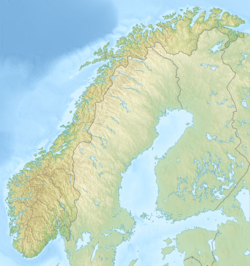Store Skagastølstind
| Store Skagastølstind | |
|---|---|
 Seen from Dyrhaugsryggen. Vetle Skagastølstind to the left. | |
| Highest point | |
| Elevation | 2,405 m (7,890 ft) |
| Prominence | 1,010 m (3,310 ft)[1] |
| Isolation | 30.3 to 30.5 km (18.8 to 19.0 mi) |
| Listing | 3rd highest in Norway |
| Coordinates | 61°27′41″N 07°52′17″E / 61.46139°N 7.87139°E |
| Geography | |
| Location | Årdal and Luster, Vestland, Norway |
| Parent range | Hurrungane |
| Topo map | 1517 IV Hurrungane |
| Climbing | |
| First ascent | 21 July 1876, William Cecil Slingsby |
| Easiest route | Climbing and ice climbing |
Store Skagastølstind (also known as Storen) is the third highest peak in Norway. It is situated on the border between the municipality of Luster and Årdal in Vestland county, Norway. The 2,405-metre (7,890 ft) mountain is part of the Hurrungane range. The mountains Vetle Skagastølstind and Midtre Skagastølstind lie immediately to the north of this mountain and the mountains Sentraltind and Jervvasstind lie immediately to the east of this mountain.
The summit is a popular destination for mountaineers, but it is fairly difficult to climb. The first ascent of Store Skagastølstind was made by William Cecil Slingsby on 21 July 1876. There are a number of different routes, the most popular being Heftyes renne (Heftye's couloir). Another popular route of ascent is via Andrews renne (Andrew's couloir), used in the first ascent of A. W. Andrews and party in 1899. It is part of the Skagastøl Traverse, one of Norway's most challenging climbing routes. The first ascent of the traverse was made by George Wegner Paus, Harold Raeburn, Kristian Lous and Kristian Tandberg on 5 August 1902. Store Skagastølstind and the mountaineering of the late 19th century in Norway is traditionally linked to the historical hotel Turtagrø.
Name
[edit]The first element is the genitive of the name of the mountain farm Skagastølen and the last element is tind which means "mountain peak". The mountain farm (dairy farm) Skagastølen belongs to the farm Skagen in Luster and stølen is the finite form of støl which means "mountain farm". Skagen is the finite form of skage which means "headland" or "promontory" and the name is equivalent with the famous Skagen in Denmark. Store or Storen means "The Big".
Ascents
[edit]Slingsby's first ascent in 1876 was hailed as a major achievement, and Johannes Heftye soon felt it eclipsed his own first ascent of Store Knutsholstinden the year before. He set out to ascend Storen in 1880 and successfully used the popular route that is now named after him to reach the summit. This route is significantly more difficult than Slingsby's route, and also more difficult than Heftye's own route on Store Knutsholstind, however, Heftye downplayed this achievement to emphasize his own first ascent.[citation needed] His main claim was that Store Knutsholstind was at least as difficult as Storen, thus, must be regarded a first grade mountain.
While Heftye's route on Store Knutsholstind may have been slightly more difficult than Slingsby's route on Storen, Heftye was at the time unaware that there were an easier route on Store Knutsholstind. Slingsby was approached by Marie Sønstenes, a woman who lived on farm near Store Knutsholstind, who claimed that she knew a straightforward route. Together, they ascended the mountain by this route. Heftye, who was very outspoken against female mountaineers, was humiliated and deeply offended.[2]
It is part of the Skagastøl Traverse, one of Norway's most challenging climbing routes. The first ascent of the traverse was made by George Wegner Paus, Harold Raeburn, Kristian Lous and Kristian Tandberg on 5 August 1902.
See also
[edit]References
[edit]- ^ "Climbed mountains with prominence exceeding 1000 meters".
- ^ Johnsen, Ben (1991). Jotunheimens stortopper: folk og fjell gjennom tidene. NTK. pp. 99–101. ISBN 978-82-992317-0-1.
Further reading
[edit]- Slingsby, Cecil; Howard, Tony (2003). Norway: the Northern Playground. Rockbuy Limited. ISBN 978-1-904466-07-9. Slingsby's story of the first ascent of Store Skagastølstind in 1876.
- Johnsen, Ben (1991). Jotunheimens stortopper: folk og fjell gjennom tidene. NTK. pp. 99–101. ISBN 978-82-992317-0-1. English guidebook to Store Skagastølstind


 French
French Deutsch
Deutsch
